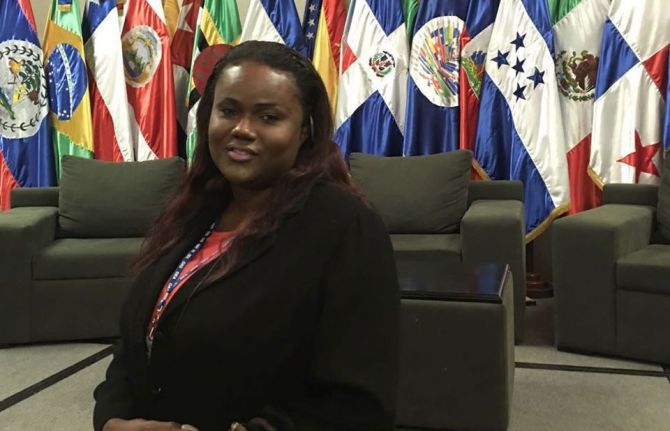

Feature Story
Caribbean community organizations call for decisive action to end homophobic abuse and cyberbullying
29 May 2020
29 May 2020 29 May 2020Ulysease Roca Terry was a gay Belizean fashion designer living with HIV. He had recently lost his mother and was coping with depression. Even without a new pandemic, it was a difficult time.
He was arrested for breaching COVID-19 curfew laws in April. While in custody he suffered homophobic slurs and bullying by a police officer. A video of the abuse was posted to social media. He also claimed that he was physically attacked while detained. Days later he died.
This month in the Bahamas, a video circulated on social media of a gender non-conforming woman being beaten by three men hurling homophobic slurs. One man smashed a piece of wood onto her head. Others slapped and punched her. As the video circulated online, some made fun of the victim.
While countries in the Caribbean focus on combatting COVID-19, community organizations have been raising their voices against the casual verbal, physical and emotional abuse that is a feature of life in the region for far too many lesbian, gay, bisexual, transgender and intersex (LGBTI) people. And they are sounding an alarm that this cruelty is increasingly playing out online.
Caleb Orozco of the United Belize Advocacy Movement (UNIBAM) spoke about Mr Roca Terry’s case with a mix of sorrow and defiance. Mr Orozco is used to tough battles. He was the litigant who successfully challenged Belize’s law banning consensual sex between same-sex partners in 2016.
“The police cannot erode public confidence in its law enforcement role by showing disregard for the dignity and rights of individuals who are members of the most vulnerable groups: those with mental health challenges, those living with HIV and those with different sexual orientation,” Mr Orozco said. “It is the responsibility of the police department to enforce the curfew in a manner that is reasonable. Mocking people does not help to build public confidence that the police are there to protect ordinary citizens.”
UNIBAM is calling for a transparent investigation, a review of the autopsy report and action to improve how the police treat members of vulnerable and marginalized communities, particularly in the context of the COVID-19 restrictions.
In Belize, a national dialogue is under way around a proposed Equal Opportunities Bill. A UNAIDS public opinion survey conducted in 2013 found that Belize was among the more tolerant Caribbean countries, with 75% of respondents agreeing that people should not be treated differently based on their sexual orientation. But this incident is a reminder that notwithstanding strides made in social attitudes and the law, pervasive challenges remain around prejudice and the abuse of power.
The Bahamas Organization of LGBTI Affairs has called the attack circulated on social media a hate crime and demanded that the perpetrators be prosecuted.
“Around the world, this kind of hate crime—the targeting of a person with extreme violence because of who they are—is denounced as among the most reprehensible modes of human conduct imaginable,” Rights Bahamas said.
Alexus D’Marco, Executive Director of the Bahamas Organization of LGBTI Affairs, insisted that there must be a broader dialogue and action to address social attitudes.
“What does it say about us as a people that so many consider this a source of humour and entertainment? What are we to think when so many of the culprits are fellow women, who should be standing together in solidarity to oppose the many injustices faced in common as members of an oppressed gender in this society?” Ms D’Marco demanded.
The Bahamas is the only Caribbean country to have decriminalized sex between consenting adults of the same sex by an act of parliament. Still, lots more work needs to be done to bring social attitudes in line with the law. Advocates insist that hate crime legislation must urgently be enacted and enforced.
In both the Bahamas and Belize, state entities have joined civil society to denounce the attacks. The National AIDS Commission, the Office of the Special Envoy for Women and Children and the Ministry of Human Development, Social Transformation and Poverty Alleviation have called for Mr Roca Terry’s case to be thoroughly investigated. In the Bahamas, the Ministry of Social Services and Urban Development called for a swift prosecution to signal zero tolerance by the government and society for gender-based violence.
“Alongside legislative reform and key population programmes, we must continue the social dialogue and law enforcement to create more peaceful and inclusive Caribbean societies for all,” said James Guwani, UNAIDS Director for the Caribbean.



